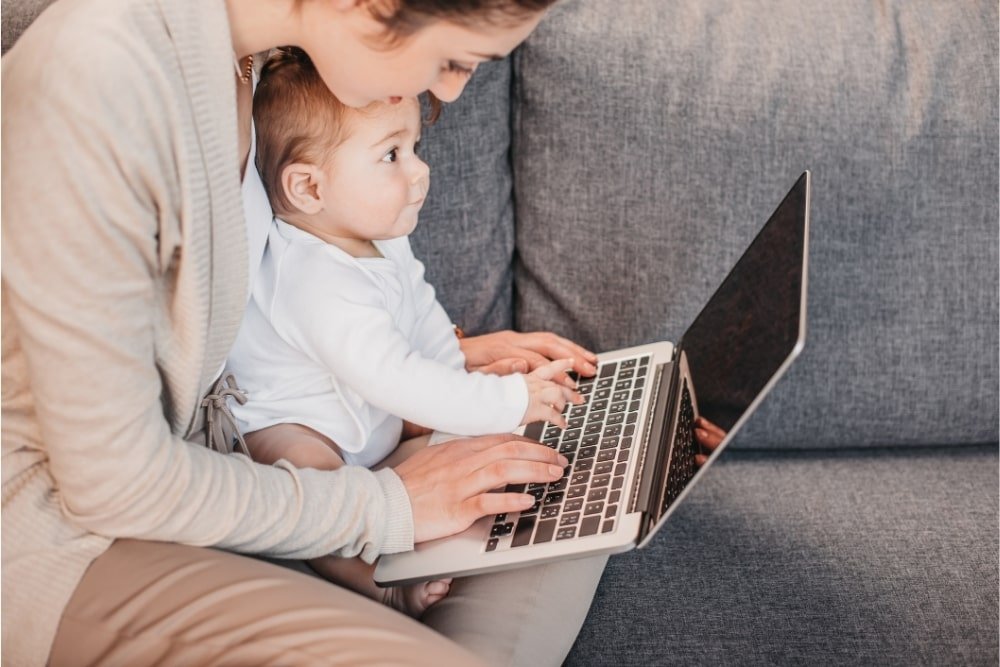Some parents worry about how their children feel about leaving their parents. It can be during the first date with our spouse, or the first time they go to daycare.
These are all major milestones in your child’s development, and they come with more independence on their part. Yet, the side that no one seems to recognize that often is how parents feel separation anxiety.
The reality is you can experience symptoms of separation anxiety, right after birth most mothers feel it.
Do these mothers who are experiencing separation anxiety know that’s what they are feeling though? A lot of the times they don’t know that’s what their anxiety or extreme worry is all about.
To be quite honest, I didn’t even hear the term separation anxiety until my 5th child. I can testify it would have helped a lot during all my years of motherhood to at least know when to recognize these overwhelming feelings.
Let’s bring light to the less often discussed yet detrimental feeling of a mother’s separation anxiety. This is a bigger issue than society recognizes.
Mothers experiencing this kind of anxiety should feel comfortable asking for a helping hand when needed.
Through experience as a mother, I can vouch for how truly important it is to take time for ourselves that way new feelings aren’t manifested in time.
Symptoms of separation anxiety in mothers include, but are not limited to:
- Feeling quite sad or being overrun with heavy sensations of sadness.
- Constantly worrying over everything from where your baby is to your kid’s future.
- You might feel guilty, unrightfully so – your guilt towards many things in motherhood is exaggerated.
- Symptoms of general anxiety have taken over, this might eventually lead to panic attacks.
Any of these symptoms can extend far into affecting the personal lives of mothers who experience them, from their relationships to simply having the motivation to do anything.
The hope of this article is that we can stand together with new and experienced mothers. So that they can practice these coping mechanisms, rather than feeling out of control.
View in gallery
Leaving Little Ones Is Extremely Difficult
The moment is here, where you and your little one have to separate after all. You knew it would come eventually, but what you didn’t know is the overwhelming feelings of anxiety that it would bring with it.
I mean you’ve seen it on tv, and other mothers seem just fine when they leave their babies.
Why does it feel this way for you? That all the worries in the world are amplified all at once, and maybe you don’t even trust the other person who is supposed to care for your child.
You thought you did, but, even your own mother might do something different than you would have with your baby while your away.
And that aspect scares you so you start to cry at the moment. Breaking into an awkward departure to your first day of work or a night out with your husband.
This scenario is a good example of a mother experiencing separation anxiety. The worst part is that most mothers are completely unaware that what they are going through is called separation anxiety.
Our babies make it quite known that they love us when we are leaving them, it seems to be an even bigger statement coming from them.
They’re experiencing their own form of separation anxiety about the situation too. In the end, that might make us feel all kinds of ways.
Guilt is among just one of the most intense emotions we feel as we leave our baby with a new babysitter. At that moment we should be there for our little ones, no matter what, right? That’s what being a good parent is, being there for them.
But, psychologists find that mothers who are experiencing separation anxiety don’t have an issue being there for their babies. In fact, they never want to leave. They could never leave if the situation didn’t present that they absolutely had to.
Mothers have valid reasons to not want to leave their children too such as not trusting others to watch our kids, feeling guilty about forking over money towards the cost of a night out, and let’s not forget the exhausting planning around everyone’s schedules.
These are all things we have to face as new mothers, and even with kids that are older. Some mothers even have fun with these aspects of parenthood, planning a night out is a lot of fun. It’s all about perspective in the end.
Ways To Prepare To Leave Smoothly
- Give your family extra time for planning 3-4 weeks ahead of time for a night out rather than 1-2 weeks ahead of time.
- Have many conversations with your partner, baby, and the person who will be watching over your little one beforehand.
- Schedule a store trip or outing right after you’ve fed or napped with your baby.
- Have a few practice runs before the time approaches.
- Don’t watch scary or gory movies in the few weeks before your due to leave your child.
- Use a caregiver you trust and keep this person consistent when it comes to outings.
- Create a ‘Goodbye’ routine before the time comes with your baby, and stick to it.
To Care For Yourself As A Mom, You Need To Leave Your Baby Temporarily
Mothers experiencing separation anxiety often find ways to not be away from their babies. In fact, mothers who have separation anxiety love to stay with their babies.
Sometimes even going without a shower is an issue for mothers with severe separation anxiety. It’s important to have time away from our babies in order to take care of ourselves.
The African Proverb is a great example of the importance to raise kids in the right manner.
“It takes a village to raise a child.”
This proverb means that an entire community should interact, communicate, and be with kids during their childhood years in order for them to be raised in a healthy manner.
Having many people there to support and interact with your children, make it easier for parents to raise their children. For mothers, it’s necessary to have time away from their babies and small kids especially.
Mothers who feel overly burdened to care for their children 24/7 often end up with other symptoms like postpartum depression or lack of motivation towards their own goals.
We need to remember as mothers that caring for our child ultimately means accepting help and seeking out a system that works to provide us with adequate time for self-care.
How To Implement Time Towards Self-care In the Beginning
View in gallery
Dedicate “homemade spa-time” in your own bathroom – face masks, new lotions, and Epsom salt baths are a great way to start having time alone for self-care, especially with new babies.
If necessary you can always set baby outside the bathroom in a little swing if there is no one there to watch over your baby.
Take a walk outside of your home while your partner, a trusted friend, or a babysitter watches your baby. Even a five-minute walk gives you a bit of time to explore how it feels to be without a baby.
Plan time at the gym or outside to get a mini-workout in. After you’ve healed from postpartum trauma physically, it can be really nice to direct your energy towards being healthier for you and your baby.
It might be a bit easier to leave your baby to work on your body aesthetics and overall health again. It’s clear that mothers of young kids need ample energy to run around with them and be the best mother possible.
Do a bit of yoga in your living room, while the baby has time in the other room. This will give you mental clarity and calm your anxieties for a moment. Implement this calmness into your routine when leaving your baby too.
Address Fears In An Appropriate Manner
Addressing our fears and separation anxiety as a mother is another topic of the conversation entirely.
Mothers going through separation anxiety often don’t know that they’re even experiencing the symptoms of it, let alone be able to address what they are going through in a healthy manner.
Hand in Hand Parenting refers to their methods of addressing the mother’s feelings by teaching parents to “have long goodbyes.”
This means that they tell mothers to stay with their child as long as they possibly can when dropping them off at daycare or leaving for a night out.
Sit and evaluate why they feel the way they do and focus on figuring out why they feel the ways they do. Long goodbyes give mothers the opportunity to express their emotions and the hardship they’re experiencing.
It’s best to have another adult present for the troubled mother to express herself. We aren’t talking about sitting through it alone or telling your child how you feel.
You should find a trusted adult to talk with, whether it be a spouse, a friend, or the caregiver who you’re leaving your child with. Sitting with it, and not rushing off while leaving is a great approach to resolving separation anxieties.
View in gallery
Bring awareness to your most feared-fears, this is the best way to resolve them within your mentality.
Be Fully Present and Work to Resolve Past Experiences
Parents with separation anxiety tend to overfill the losses from their own childhoods as they parent their own children. It makes sense for anyone to do this, but it isn’t healthy to do.
Being fully present means creating new methods of parenting yourself. Rather than getting stuck in the sense of lack that took root because of your own childhood.
You might have had a lot happen that was traumatizing at different points in your lifetime, from partners to your own parents, to otherwise unhealthy relationships.
They happen to all of us at some point, and we shouldn’t carry them over to the prime of being a parent ourselves.
The dynamic of your family will be healthier and far more wholesome when we focus on being present. This can be hard when you’re still working through your own personal hardships.
Yet, it is possible to pave the pathway to a better childhood for your own kids.
Face What You Can the Moment it Arises
Don’t fall into the pattern of failed attempts to resolve your own childhood traumas. Think of your own parenting as a clean slate.
You can aim to make it up with all the things you love and cherish, instead of the things you are lacking emotionally. This is all possible while you work towards making resolutions towards your own childhood.
Kids with parents who are fully present get the opportunity to experience more deeply the positive aspects of growing up, they have open lines of communication with their mothers and end up creating deeper bonds with their parents well into adulthood.
If you have an episode where you are feeling anxious about leaving your baby, explore those feelings right then. Question where it’s coming from, and if it has anything to do with personal experience in your own childhood.
Have Someone Who Can Listen to You and You Listen to Them
You could create a listening partnership with another parent, that would be best. Or it can be someone who you trust, too. The point of this practice is to have physical and emotional releases of energy with your anxieties.
When you’re able to discuss your separation anxieties openly, especially with other parents you’re able to process them better. During a ‘listening’ session, the person who is doing the listening to you – aims to not interrupt.
Without input from others, the mind is allowed to work on resolving internal conflicts on its own. The mind is an amazing concept – oftentimes it’s able to work through problems on its own.
When you give it the space to explore the issues within it, the mind is resilient in resolving obstacles. It’s not unusual for parents to cry, laugh, or display other types of outward reactions to separation anxiety – as a way of finally releasing them from their consciousness.
Support Groups Online For Mothers Can be Beneficial
In our society, there is endless support for mothers suffering from separation anxiety. If you aren’t ready to go to a therapist to discuss what you’re going through.
You can look to social media platforms like Facebook Group Pages, or, Meetup to connect with other mothers who are also dealing with postpartum separation anxiety or mothers who have mental health issues.
View in gallery
A little support can go a really long way, when you have little kids this is more true than ever before.
We often don’t realize how far off in the left-field our behaviors, emotions, and coping mechanisms have been until we are able to hear other’s stories of separation anxiety.
The mental health crisis in America, rely’s on people uniting to resolve personal issues. I have always been pleasantly surprised at how immensely helpful and thoughtful strangers can be in support groups online.
Use the search bar on Facebook or Meetup to search for “Postpartum” or “Mental Health in Parenthood” groups. At first, you can just read what others have to say if you aren’t feeling like engaging.
Overtime mothers usually find it easy to speak out about their own experience through the inspiration of other mothers who are also going through separation anxiety.
Lifestyle Factors That Invoke Maternal Separation Anxiety Disorder in Mothers
You might be wondering at this point what causes separation anxiety disorder in the first place. After all, some mothers get through motherhood without experiencing any of these symptoms.
Some mothers see a healthy side to leaving their babies from a young age. At 10 weeks, infants don’t suffer when they’re without their mothers and have bottles to drink so it certainly isn’t the baby choosing to hold mom hostage to the point of no shower.
It turns out there are a few common causes of maternal anxiety separation disorder for the majority of mothers who experience it.
- Major life or environmental shifts
- Too much stress
- Being overprotective of your children
- Personal insecurities
Sources
The Reality Of Coping With Maternal Separation Anxiety






